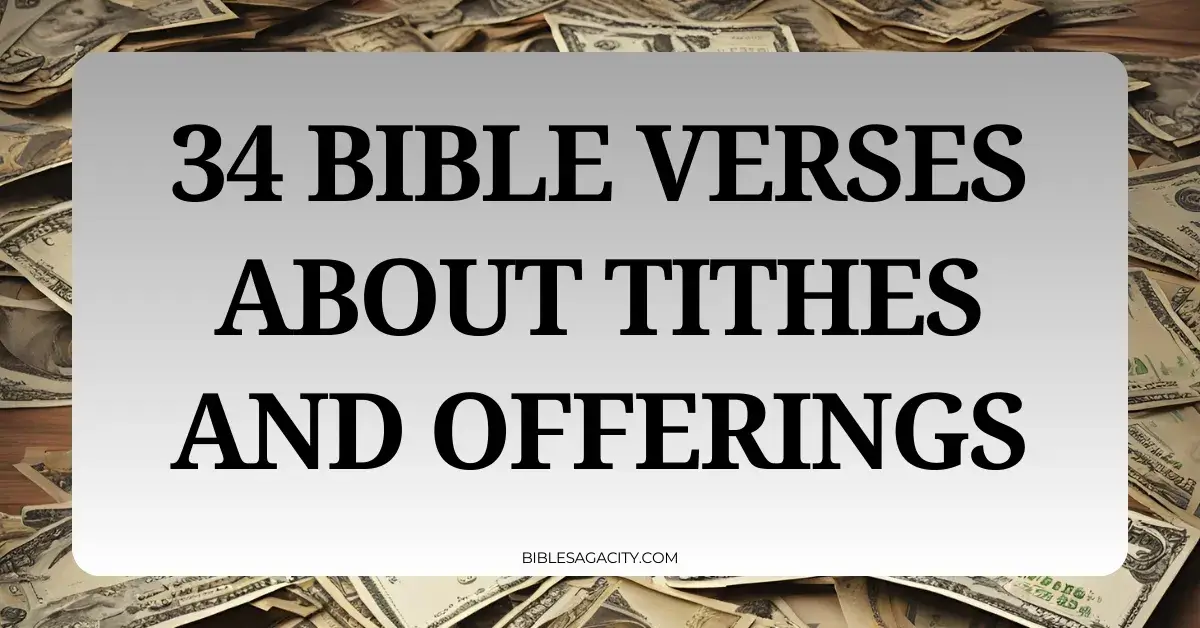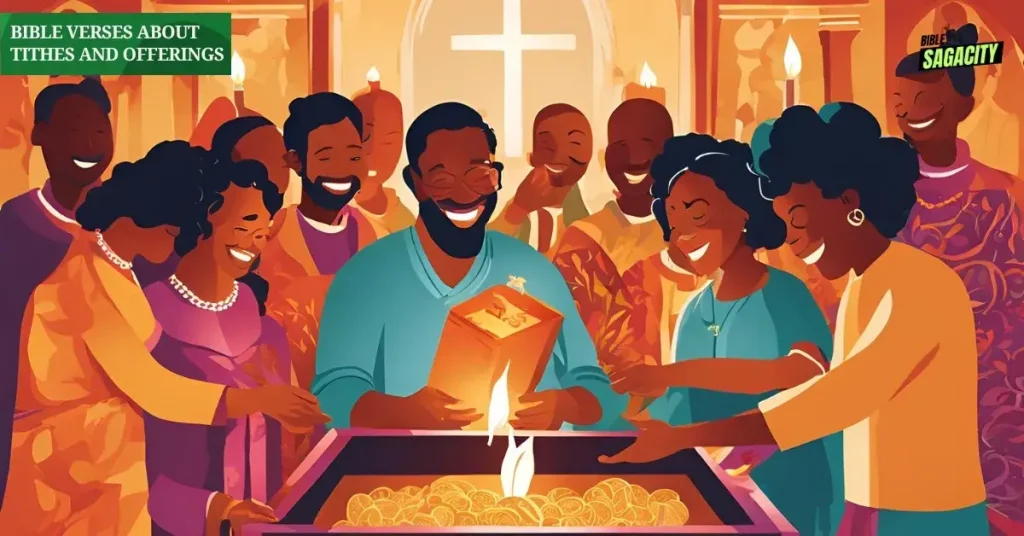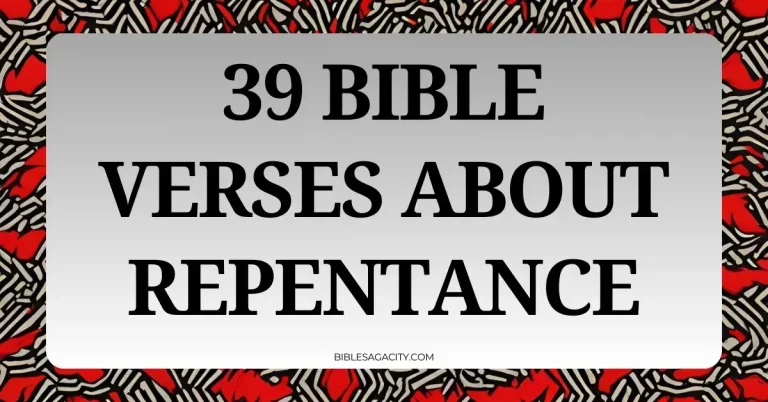34 Bible Verses About Tithes And Offerings

God gave us commands in the bible verse about tithes and offerings to remain a good servant of God and always give money in God’s way. God likes a person who spends his wealth in the way of God with honesty and love. Spending money is not a good deed but spending money with love, faith and honesty is a real good deed God rewards those who do this. There are many personalities in the bible regarding tithes and offerings like Abraham, Moses, David, Solomon, Cain and Abel, A widow, Israelites and Mary.
God’s Command Regarding Tithes And Offerings

Verse#1
A tithe of everything from the land, whether grain from the soil or fruit from the trees, belongs to the Lord; it is holy to the Lord.
Book
Old-Testament
Reference
Leviticus 27:30
Explanation
Moses states in this Bible verse that when people grow crops and their harvest comes up, they ought to donate a tenth of it to God. People should give away anything they can control and develop in God’s way, whether it is a crop or the fruit of any tree.
Verse#2
Be sure to set aside a tenth of all that your fields produce each year.
Book
Old-Testament
Reference
Deuteronomy 14:22
Explanation
The Israelites are exhorted in this verse to always give tithes in accordance with God’s will. The tithe should be paid to God annually so that the poor will benefit from it.
Verse#3
Bring the whole tithe into the storehouse, that there may be food in my house. Test me in this,” says the Lord Almighty, “and see if I will not throw open the floodgates of heaven and pour out so much blessing that there will not be room enough to store it.
Book
Old-Testament
Reference
Malachi 3:10
Explanation
In this verse, God says that when a person gives some part of his treasure in the way of God, God blesses him immensely and showers blessings on him. God is explaining in this verse that if someone wants to test God, he should test and see. He will always receive God’s blessings, mercies and blessings.
Verse#4
I give to the Levites all the tithes in Israel as their inheritance in return for the work they do while serving at the tent of meeting.
Book
Old-Testament
Reference
Numbers 18:21
Explanation
In this verse, Moses says that the Levites used to gather in the tabernacle to serve God and were given a tithe. Therefore they should have given Tithes so that they could worship God attentively and attentively.
Verse#5
As soon as the order went out, the Israelites generously gave the first fruits of their grain, new wine, olive oil and honey and all that the fields produced. They brought a great amount, a tithe of everything.
Book
Old-Testament
Reference
2 Chronicles 31:5
Explanation
In this verse, God says that when the Israelites received the command from God, they gave a share of their grain and the produce of the field. It was the generosity of the Israelites and obedience to God.
Verse#6
Woe to you, teachers of the law and Pharisees, you hypocrites! You give a tenth of your spices—mint, dill and cumin. But you have neglected the more important matters of the law—justice, mercy and faithfulness. You should have practiced the latter, without neglecting the former.
Book
New-Testament
Reference
Matthew 23:23
Explanation
In this verse, Jesus says that if someone gives Tithes but does not have fear of God, faith and justice in his heart, then God does not like such a servant. Therefore, if one gives Tithes, he should have faith in his heart and act justly.
Verse#7
Woe to you Pharisees, because you give God a tenth of your mint, rue and all other kinds of garden herbs, but you neglect justice and the love of God. You should have practiced the latter without leaving the former undone.
Book
New-Testament
Reference
Luke 11:42
Explanation
Jesus claims in this verse that the Pharisees became impure because, despite their tithes of mint and various herbs, they did not believe in their hearts and denied God’s love. However, God dislikes those who gave tithe in God’s way but lack a God’s fear and love for Him.
Verse#8
Now the law requires the descendants of Levi who become priests to collect a tenth from the people—that is, from their fellow Israelites—even though they also are descended from Abraham.
Book
New-Testament
Reference
Hebrews 7:5
Explanation
The law of the old days states in this Bible verse that the tribe of Levi was given tithes and continues to receive them because of their commitment to serving God.
Verse#9
On the first day of every week, each one of you should set aside a sum of money in keeping with your income, saving it up, so that when I come no collections will have to be made.
Book
New-Testament
Reference
1 Corinthians 16:2
Explanation
Paul states in this verse that when he came to collect tithes, the people should save a portion of their earnings so that they wouldn’t need to accept donations and could utilize the funds to support the churches.
Verse#10
Therefore, I urge you, brothers and sisters, in view of God’s mercy, to offer your bodies as a living sacrifice, holy and pleasing to God—this is your true and proper worship.
Book
New-Testament
Reference
Romans 12:1
Explanation
Paul says in this verse that we should offer all types of sacrifices if we want to be blessed by God because God likes those who give what they love in God’s way.
The Blessings of Giving Tithes And Offerings

Verse#11
Honor the Lord with your wealth, with the first fruits of all your crops; then your barns will be filled to overflowing, and your vats will brim over with new wine.
Book
Old-Testament
Reference
Proverbs 3:9-10
Explanation
In this verse, Solomon says that if a person wants to fill his storehouses and receive God’s blessings, he wants his produce to grow very well, then he should give tithes in the way of God and honor God. God commands that all His wealth be given in His way.
Verse#12
Give generously to them and do so without a grudging heart; then because of this the Lord your God will bless you in all your work and in everything you put your hand to.
Book
Old-Testament
Reference
Deuteronomy 15:10
Explanation
In this verse, Moses says that we have to give our wealth in the way of God in every situation. If we do this, we will never be sad and God will bless everything we do.
Verse#13
Good will come to those who are generous and lend freely, who conduct their affairs with justice.
Book
Old-Testament
Reference
Psalm 112:5
Explanation
This verse states that in the eyes of God, man is the one who provides tithes in God’s way, but he does it liberally and justly. A person’s heart must be pure in order to give in God’s way.
Verse#14
Give, and it will be given to you. A good measure, pressed down, shaken together and running over, will be poured into your lap. For with the measure you use, it will be measured to you.
Book
New-Testament
Reference
Luke 6:38
Explanation
According to Jesus in this bible verse, God provides more to those who give in the path of God. They are also extremely blessed.
Verse#15
Remember this: Whoever sows sparingly will also reap sparingly, and whoever sows generously will also reap generously.
Book
New-Testament
Reference
2 Corinthians 9:6
Explanation
Paul states in this verse that those who give little will receive little in return, while those who give abundantly and generously would receive many times more.
Verse#16
In everything I did, I showed you that by this kind of hard work we must help the weak, remembering the words the Lord Jesus himself said: ‘It is more blessed to give than to receive.
Book
New-Testament
Reference
Acts 20:35
Explanation
Paul states in this verse that since a man’s giving is superior to his taking, he should aid others and contribute in God’s way. Because he who contributes is generous, and God blesses the generous.
Tithes And Offerings And 18 Biblical Personalities

Abraham
The wealth that Abraham got from the war, he gave a tenth of it in the way of God.
Then Melchizedek king of Salem brought out bread and wine. He was priest of God Most High, and he blessed Abram, saying, “Blessed be Abram by God Most High, Creator of heaven and earth. And praise be to God Most High, who delivered your enemies into your hand.” Then Abram gave him a tenth of everything. (Genesis 14:18-20)
Jacob
Jacob promised God that if God would protect him and save him from his enemies, he would always spend his wealth in the way of God.
Then Jacob made a vow, saying, “If God will be with me and will watch over me on this journey I am taking and will give me food to eat and clothes to wear so that I return safely to my father’s household, then the Lord will be my God and this stone that I have set up as a pillar will be God’s house, and of all that you give me I will give you a tenth.” (Genesis 14:18-20)
Moses
According to God’s command, Moses taught the Israelites to give wealth from their land in the way of God.
A tithe of everything from the land, whether grain from the soil or fruit from the trees, belongs to the Lord; it is holy to the Lord. (Leviticus 27:30)
A Poor widow
A widow was very poor but she gave her last morsel of bread to satisfy the hunger of God’s prophet Elijah. God liked this very much. He never allowed this woman to be needy again.
So he went to Zarephath. When he came to the town gate, a widow was there gathering sticks. He called to her and asked, “Would you bring me a little water in a jar so I may have a drink?” As she was going to get it, he called, “And bring me, please, a piece of bread.” “As surely as the Lord your God lives,” she replied, “I don’t have any bread—only a handful of flour in a jar and a little olive oil in a jug. I am gathering a few sticks to take home and make a meal for myself and my son, that we may eat it—and die.” Elijah said to her, “Don’t be afraid. Go home and do as you have said. But first make a small loaf of bread for me from what you have and bring it to me, and then make something for yourself and your son. For this is what the Lord, the God of Israel, says: ‘The jar of flour will not be used up and the jug of oil will not run dry until the day the Lord sends rain on the land.’” She went away and did as Elijah had told her. So there was food every day for Elijah and for the woman and her family. For the jar of flour was not used up and the jug of oil did not run dry, in keeping with the word of the Lord spoken by Elijah. (1 Kings 17:10-16)
David
When God’s house was being built, David made every effort and gave his wealth in the way of God.
Besides, in my devotion to the temple of my God I now give my personal treasures of gold and silver for the temple of my God, over and above everything I have provided for this holy temple: three thousand talents of gold (gold of Ophir) and seven thousand talents of refined silver, for the overlaying of the walls of the buildings, for the gold work and the silver work, and for all the work to be done by the craftsmen. Now, who is willing to consecrate themselves to the Lord today?” (1 Chronicles 29:3-5)
The Israelites
The Israelites promised God that they would give the first produce from their fields in God’s way.
We also assume responsibility for bringing to the house of the Lord each year the firstfruits of our crops and of every fruit tree. “As it is also written in the Law, we will bring the firstborn of our sons and of our cattle, of our herds and of our flocks to the house of our God, to the priests ministering there. “Moreover, we will bring to the storerooms of the house of our God, to the priests, the first of our ground meal, of our grain offerings, of the fruit of all our trees and of our new wine and olive oil. And we will bring a tithe of our crops to the Levites, for it is the Levites who collect the tithes in all the towns where we work. (Nehemiah 10:35-37)
Barnabas
Barnabas was a person who was very much in the first place in bringing the teachings of Christianity to the people and in serving Christianity. He sold his land to feed the needy.
Joseph, a Levite from Cyprus, whom the apostles called Barnabas (which means “son of encouragement”), sold a field he owned and brought the money and put it at the apostles’ feet. (Acts 4:36-37)
Ananias and Sapphira
The hearts of Sapphira and Ananias were not pure. They provided wealth in God’s way while lying. Because of their fraud, God punished them and rejected their sacrifice.
Now a man named Ananias, together with his wife Sapphira, also sold a piece of property. With his wife’s full knowledge he kept back part of the money for himself, but brought the rest and put it at the apostles’ feet. Then Peter said, “Ananias, how is it that Satan has so filled your heart that you have lied to the Holy Spirit and have kept for yourself some of the money you received for the land? Didn’t it belong to you before it was sold? And after it was sold, wasn’t the money at your disposal? What made you think of doing such a thing? You have not lied just to human beings but to God.” When Ananias heard this, he fell down and died. And great fear seized all who heard what had happened. Then some young men came forward, wrapped up his body, and carried him out and buried him. About three hours later his wife came in, not knowing what had happened. Peter asked her, “Tell me, is this the price you and Ananias got for the land?” “Yes,” she said, “that is the price.” Peter said to her, “How could you conspire to test the Spirit of the Lord? Listen! The feet of the men who buried your husband are at the door, and they will carry you out also.” At that moment she fell down at his feet and died. Then the young men came in and, finding her dead, carried her out and buried her beside her husband. Great fear seized the whole church and all who heard about these events. (Acts 5:1-11)
A Young Rich Man
There was a young man. Jesus advised him to donate his wealth in God’s way if he wished to become closer to God. However, he didn’t do this sacrifice because he had a great love for his wealth.
Jesus answered, “If you want to be perfect, go, sell your possessions and give to the poor, and you will have treasure in heaven. Then come, follow me.” When the young man heard this, he went away sad, because he had great wealth. (Matthew 19:21-22)
Early Christians
When the message of Christianity was brought to the people and as many became Christians in the beginning, they sold all their possessions to meet the needs of the needy.
All the believers were together and had everything in common. They sold property and possessions to give to anyone who had need. (Acts 2:44-45)
Solomon
Solomon sacrificed a lot during the construction of the temple and thanked God.
Solomon offered a sacrifice of fellowship offerings to the Lord: twenty-two thousand cattle and a hundred and twenty thousand sheep and goats. So the king and all the Israelites dedicated the temple of the Lord. (1 Kings 8:63)
Job
Job used to make sacrifices for his children in the morning so that their sins could be forgiven and his wealth could be given in the way of God.
When a period of feasting had run its course, Job would make arrangements for them to be purified. Early in the morning he would sacrifice a burnt offering for each of them, thinking, “Perhaps my children have sinned and cursed God in their hearts.” This was Job’s regular custom. (Job 1:5)
Jesus
Jesus always exhorted us to give our good and close things to God so that God would give us more.
Give, and it will be given to you. A good measure, pressed down, shaken together and running over, will be poured into your lap. For with the measure you use, it will be measured to you.” (Luke 6:38)
Paul
Paul advised that when we spend money in God’s way, we should have good intentions because God accepts the sacrifice of those who have good intentions, love and respect of God in heart.
Each of you should give what you have decided in your heart to give, not reluctantly or under compulsion, for God loves a cheerful giver. (2 Corinthians 9:7)
Hezekiah
Hezekiah always used to spend his wealth in the way of God and also advised people to give the first part of their wealth in the way of God.
He ordered the people living in Jerusalem to give the portion due the priests and Levites so they could devote themselves to the Law of the Lord. As soon as the order went out, the Israelites generously gave the firstfruits of their grain, new wine, olive oil and honey and all that the fields produced. They brought a great amount, a tithe of everything. (2 Chronicles 31:4-5)
Cain and Abel
Cain and Abel also offered in the way of God. Cain did not give a good offering but Abel gave a much better offering. God accepted Abel’s sacrifice instead of Cain.
In the course of time Cain brought some of the fruits of the soil as an offering to the Lord. And Abel also brought an offering—fat portions from some of the firstborn of his flock. The Lord looked with favor on Abel and his offering, but on Cain and his offering he did not look with favor. So Cain was very angry, and his face was downcast. (Genesis 4:3-5)
Mary
Mary had a very precious perfume. She loved it very much and it was very dear to her. She loved Jesus very much and expressed her love by pouring this precious perfume on Jesus’ feet.
Then Mary took about a pint of pure nard, an expensive perfume; she poured it on Jesus’ feet and wiped his feet with her hair. And the house was filled with the fragrance of the perfume. (John 12:3)
Frequently Asked Questions
Conclusion
Tithes and giving money in God’s way are addressed in these verses. Since this is God’s will, we should spend our money in God’s way. God desires that a person use his wealth for God’s purposes. A person will receive considerably more if they donate a tenth of their money to God’s way, according to God’s promise. He shall get God’s gifts and grace. Tithes have the benefit of preventing people from being greedy for money. The poor and needy get their needs met by this. Tithes, or ten percent of your wealth, are required by God as a method to honor him. It is our responsibility to pay tithes to God annually. It also teaches us to fulfill God’s commands, give to the poor, and spend our money on others.






